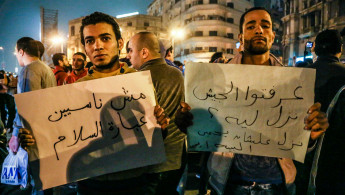Anger as Hosni Mubarak is cleared of murder
At least two people were killed in clashes between Egyptian police and protesters in central Cairo on Saturday after a court dropped a murder case against ousted dictator Hosni Mubarak, officials said.
More than 1,000 protesters had converged on Tahrir Square in Cairo after the verdict earlier in the day. Police initially fired tear gas and water cannon to disperse them.
Earlier in the day, a court had thrown out murder charges against Mubarak and acquitted his police commanders of involvement in the deaths of protesters during the early 2011 revolt that unseated him.
Seven of his security commanders, including the feared former interior minister Habib al-Adly, were also acquitted over the demonstrator deaths.
Cheers broke out in the courtroom and Mubarak's two sons, Alaa and Gamal, who had charges against them dropped, and co-defendants stooped down to kiss his forehead when the judge read out the verdict, as Mubarak lay in an upright stretcher inside the caged dock.
The ruling came after a dramatic retrial in which the former president defended his 30-year rule.
Mubarak has faced 100 trial sessions, including 25 closed-door sessions, and around 1,300 days have passed since the beginning of his mammoth trial. An appeals court overturned an initial life sentence for Mubarak in 2012 on a technicality, and Saturday's ruling can also be appealed.
Early release from prison?
The court also acquitted Mubarak of a corruption charge, but he was to remain in prison because he is serving a three-year sentence in a separate corruption case.
Mubarak’s lawyer Farid al-Deeb told AFP Sunday, however, that the 86-year-former president could benefit from early release from the military hospital where he is being held.
Mubarak "has already served two-thirds of his sentence" when time held in preliminary detention since his 2011 arrest is taken into account, Deeb said.
Victims' families anger
In contrast to the celebrations in the courtroom, relatives of those killed waiting outside were angry at the verdict.
"It's an oppressive ruling. The blood of my son has been wasted, said Mostafa Morsi, whose son was killed outside a police station during the 18-day uprising.
|
In Tahrir Square, the focal point of the protests against Mubarak, and where many protesters lost their lives, a woman said that "justive for the martyrs has been lost".
|
Mostafa Saed, a retired government worker, disagreed.
"There is no evidence against Mubarak. He was an honest president," Saed said.
Mubarak's men
The verdict comes as once-banished Mubarak-era officials make a comeback under current Egyptian president Abdel Fattah al-Sisi, who led a coup against Mubarak's democratically elected successor, Muhammad Morsi.
Morsi, a member of the Muslim Brotherhood, faced growing opposition during his period in power, and the widespread animosity towards his movement after the coup has made it easier for Mubarak-era figures to reintegrate themselves into public life, and for a not guilty verdict to be delivered.
The judge, Mahmoud Kamel al-Rashidi, had said before delivering his verdict, "God will ask me what did you do in this world, and specifically what did you do as a judge."
|
Yet some have doubted the neutrality of Egypt's judiciary, especially in light of the heavy-handed treatment meted out to opponents of Sisi, Islamist and secular, and the imprisonment of journalists.
A group calling itself 'The families of the martyrs of the January 25th revolution' said in a statement issued hours before the verdict that they considered that the judiciary had allowed itself to become swayed by politics.
"We saw with our own eyes the clear intrusion by judges in political life, those who appeared on television channels, and those who took to the streets on June 30th [2013]," the statement said.
The group added that there were documents proving the guilt of Hosni Mubarak.
Whether there is the public appetite for another retrial is doubtful, with the mood in Egypt different to the immediate period following the revolution.
A lack of security and a downturn in the economy has meant many Egyptians are willing to accept the return of the old guard.
The police force, a hated symbol during the 2011 uprising, is now feted in the largely pro-government media as it wages a deadly crackdown on pro-Morsi protesters, as well as Islamist militants.
Prime Minister Ibrahim Mahlab was a senior official in Mubarak's now dissolved party, something that would have been unthinkable in the months following the strongman's ouster.





 Follow the Middle East's top stories in English at The New Arab on Google News
Follow the Middle East's top stories in English at The New Arab on Google News
![The UAE is widely suspected of arming the RSF militia [Getty]](/sites/default/files/styles/image_330x185/public/2024-11/GettyImages-472529908.jpg?h=69f2b9d0&itok=Yauw3YTG)
![Netanyahu furiously denounced the ICC [Getty]](/sites/default/files/styles/image_330x185/public/2024-11/GettyImages-2169352575.jpg?h=199d8c1f&itok=-vRiruf5)
![Both Hamas and the Palestinian Authority welcomed the ICC arrest warrants [Getty]](/sites/default/files/styles/image_330x185/public/2024-11/GettyImages-2178351173.jpg?h=199d8c1f&itok=TV858iVg)